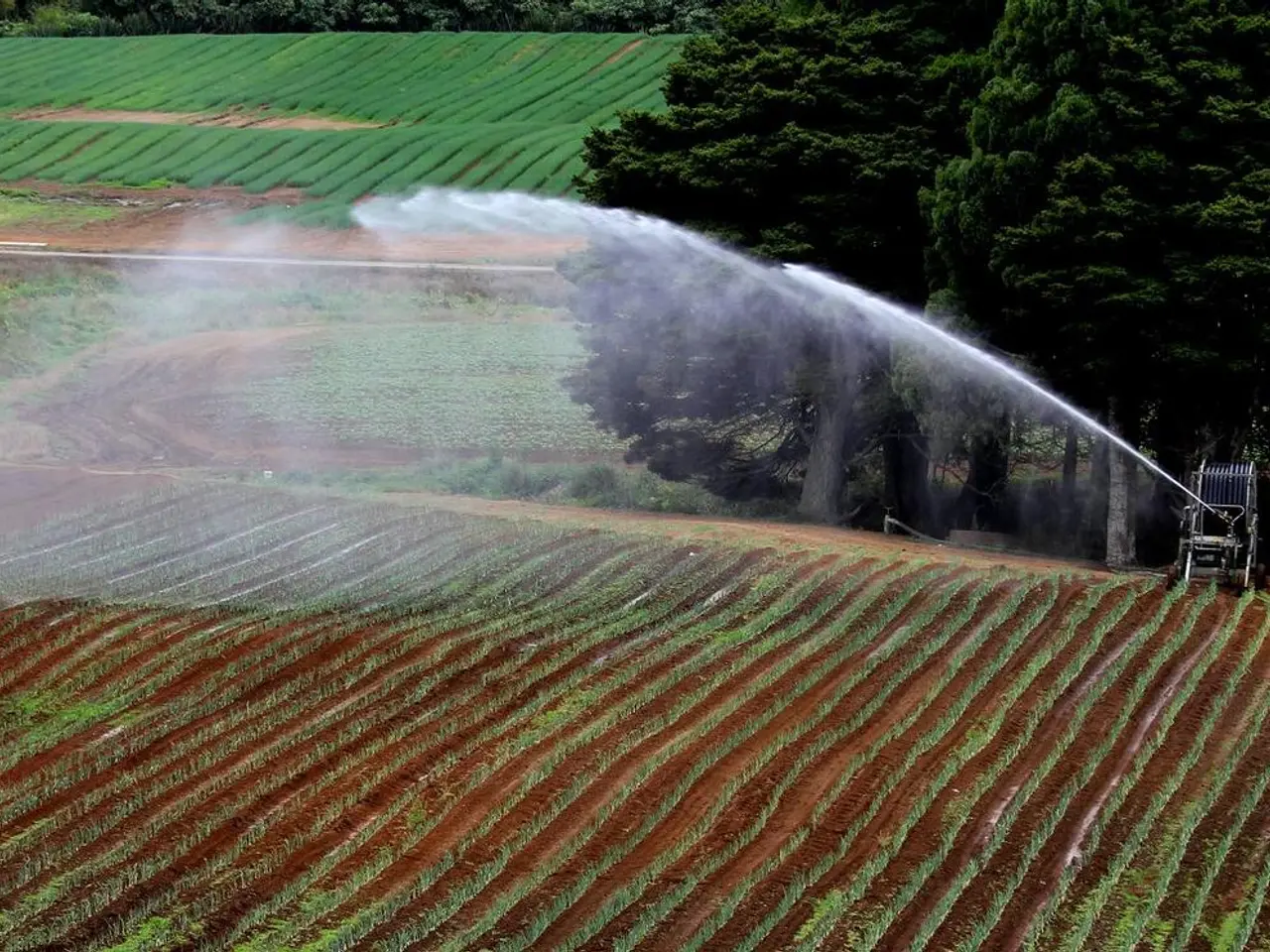City-Dwellers Embrace Agriculture-oriented Lifestyle, Shifting Focus from Urban to Rural Activities
In the bustling IT capital of Bengaluru, India, a movement is taking root. Several IT professionals are leaving the concrete jungle behind and establishing farming collectives on the city's outskirts. This shift towards a more sustainable future is aimed at building circular communities that promote environmental responsibility and accountability.
India, with its population of over 1.3 billion people, has more than half of its population dependent on agriculture for a living. However, the country is also the world's third-largest greenhouse gas emitter and is expected to have a rapidly rising carbon index in the next few years. This alarming trend has prompted many tech professionals to take action.
One such farming collective is the Tamarind Valley Collective (TVC), founded by Varun Pandey and Yathesh Kumar. The author and their husband are members of this collective, which strives to strike a balance between farm-to-table culture and the lifestyle of the villagers in Thaggatti. At TVC, 52 families work closely with villagers to promote a sustainable way of life.
Another farming collective is Vanam Farms, an 8.5-acre farm in Belalam village, run by Venkatachalam Krishnan and three others. These collectives, along with others like them, contribute to sustainable living by adopting regenerative and community-based agricultural practices.
These practices improve soil health, enhance water retention, reduce reliance on synthetic chemicals, and promote biodiversity. They help address critical issues like water scarcity, air pollution, and plastic consumption in several ways.
Peri-urban farming collectives around Bengaluru have implemented local water harvesting techniques such as building percolation pits and restoring stormwater drains. These measures improve groundwater recharge and soil moisture retention, enabling multi-cropping and increasing resilience to drought conditions. Using organic compost and mulching further enhances soil water retention by 30–40%, reducing irrigation demand.
By avoiding synthetic fertilizers and pesticides and promoting organic farming methods within collectives, emissions of harmful chemicals into the air are reduced. Creating green cover and food forests around Bengaluru helps sequester carbon and improve air quality.
Farming collectives also promote circular economy practices such as community-led composting of biowaste and greywater reuse, reducing the need for plastic packaging and chemical inputs that contribute to pollution. This waste-to-resource model decreases plastic dependency and landfill waste.
These collectives emphasize community ownership, knowledge-sharing through farmer field schools, and capacity building via farmer producer organizations (FPOs), helping scale sustainable practices that benefit livelihoods and the environment. They foster a systemic approach linking sustainable agriculture with water stewardship, climate adaptation, and reduced pollution in Bengaluru's peri-urban landscape.
However, it's not just about the environment. Farmers in India face a multitude of problems including farmer suicide, poverty rates, class oppression, and lack of access to government benefits. Navin Horo, national project coordinator of the Climate Change Knowledge Network in Indian Agriculture, suggests that urban farmers engaging with local farmers can help better handle socioeconomic aspects of environmental issues.
Shannon Olsson, the director of the Echo Network, supports urban farming and farming collectives for promoting environmental responsibility and accountability. Olsson believes that urban farming can create awareness and build a deep connection between people and their land.
Despite these initiatives, Bengaluru, with its traffic-jammed streets and high-carbon lifestyle, still faces significant challenges. Traffic keeps residents in traffic for up to three hours a day, adding up to 243 extra hours a year. Government initiatives, such as the creation of Farmer Producer Organizations (FPOs) to help farmers with technology and financial support, are a step in the right direction. However, much work remains to be done to create a truly sustainable future for Bengaluru and India as a whole.
- The Tamarind Valley Collective (TVC) is a farm-to-table cultural effort, aiming to blend villagers' lifestyles with sustainable farming practices in Thaggatti.
- Varun Pandey and Yathesh Kumar founded TVC, joining a growing number of IT professionals transforming city outskirts into farming collectives.
- Across Bengaluru, 52 families are now part of TVC, contributing to a circular community that prioritizes environmental responsibility.
- In another instance, Vanam Farms, run by Venkatachalam Krishnan and colleagues, adopts community-based agricultural practices for sustainable living.
- These collectives implement regenerative practices that enhance soil health, water retention, and biodiversity, addressing issues like water scarcity and air pollution.
- Local water harvesting techniques, such as percolation pits and restored stormwater drains, are used to improve groundwater recharge and drought resilience.
- Organic compost and mulching further boost soil water retention, cutting irrigation demand, and promoting a more sustainable lifestyle.
- Avoiding synthetic fertilizers and pesticides within the collectives reduces harmful chemical emissions, promoting carbon sequestration and improved air quality.
- The collectives also advocate for circular economy practices, reducing plastic use and dependency through community-led composting and greywater reuse.
- Urban farming collectives in Bengaluru empower farmers with knowledge-sharing sessions, promoting skills-training and better handling of socioeconomic issues.
- Navin Horo, of the Climate Change Knowledge Network in Indian Agriculture, supports this collaboration between urban and local farmers.
- Shannon Olsson, the director of the Echo Network, believes urban farming helps foster a deep connection between people and their land, promoting personal growth and environment awareness.
- Challenges remain, as Bengaluru experiences traffic congestion and a carbon-intensive lifestyle, demanding continued efforts for job-search opportunities in career development and skills-training.
- The NBA, WNBA, NCAA Basketball, sports betting, cars, travel, education-and-self-development, fashion-and-beauty, food-and-drink, home-and-garden, pets, weather, and weather-forecasting might provide distractions or entertainment amidst the ongoing movement towards sustainability in Bengaluru, showcasing the city's diverse culture and community.




